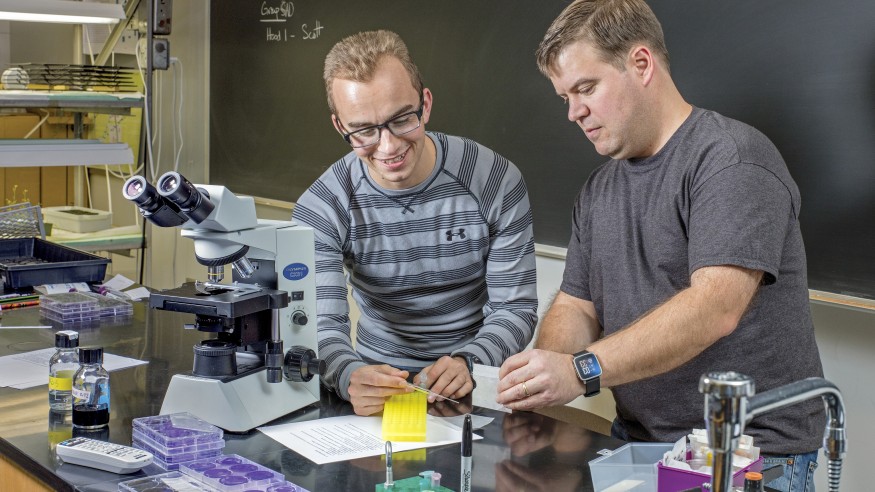
Graduate Research Fellowship
Ohio Wesleyan Alumnus Earns Competitive National Science Foundation Award
Nathan Scinto-Madonich’s interest in plant research is rooted in his classes and laboratory research at Ohio Wesleyan University.
Now pursuing a doctorate in plant science at Cornell University, Scinto-Madonich this month was awarded a National Science Foundation (NSF) Graduate Research Fellowship. Valued at $138,000, the three-year fellowship includes an annual research stipend of $34,000 and a yearly cost-of-education allowance of $12,000. He will conduct his research in the laboratory of Cornell professor Miguel Piñeros.
Scinto-Madonich, who graduated from Ohio Wesleyan in 2016 with a botany major and sociology/anthropology minor, said he will use the fellowship to explore “how plant roots adapt to adverse soil environments to support the overall growth of the plant.”
“Specifically,” he said, “I will be researching plant growth on acid soils, which affect around 50 percent of agriculturally relevant land. These soils have toxic amounts of aluminum that damage plant roots, as well as low amounts of phosphorus (a critical plant nutrient), which together lead to poor plant growth.
“To adapt to these changes,” he continued, “plants will alter the layout of their roots in the soil, and some plants do this better than others. I want to capture and understand favorable root layouts so they can be transferred to other plants that aren’t well-adapted to acidic soils. ... Ultimately, our understanding of plant adaptation to adverse environments will aid the effort to feed a growing human population.”
For two years after earning his undergraduate degree, Scinto-Madonich worked at Ohio Wesleyan as a research assistant in the laboratory of botany-microbiology professor Chris Wolverton.
“Chris Wolverton was an amazing mentor who first demonstrated to me the dynamic nature of roots and how they actively respond to their environment,” he said.
“I was extremely fortunate to work as Dr. Wolverton’s lab technician on his NASA grant for two years after graduation, during which I collaborated with amazing people trying to answer fascinating questions about root responses to gravity,” Scinto-Madonich said. “The classes and research that I did with Dr. Wolverton have greatly influenced the type of research questions I’m interested in investigating today.”
Scinto-Madonich said he also was influenced by his classes with botany-microbiology professor Laurie Anderson.
“An introductory course from Laurie Anderson got me excited about plants when I learned about how they could be used to clean up contaminated soils,” he said. “Additional courses and research projects with Dr. Anderson put into context the ways that plants affect, and are affected by, the environment.”
After he earns his doctorate, Scinto-Madonich hopes to continue his efforts to “connect current research to relevant agricultural applications and continue to share what we know about the amazing world of plants with a broad range of people.”
OWU professor Wolverton said he is proud of Scinto-Madonich for earning an NSF Graduate Research Fellowship. “These are incredibly competitive,” Wolverton said, “so this is an amazing accomplishment.”
In fact, the NSF reports, more than 500,000 people have applied for Graduate Research Fellowships since 1952, but only about 50,000 have been granted the awards. Currently, the NSF reports, “42 fellows have gone on to become Nobel laureates, and more than 450 have become members of the National Academy of Sciences.”
“These individuals are crucial to maintaining and advancing the nation’s technological infrastructure and national security as well as contributing to the economic well-being of society at large,” the foundation states.
Learn more about the NSF at www.nsfgrfp.org and more about Ohio Wesleyan’s Department of Botany and Microbiology at www.owu.edu/botany.
Founded in 1842, Ohio Wesleyan University is one of the nation’s premier liberal arts universities. Located in Delaware, Ohio, the private university offers more than 90 undergraduate majors and competes in 25 NCAA Division III varsity sports. Through Ohio Wesleyan’s signature OWU Connection program, students integrate knowledge across disciplines, build a diverse and global perspective, and apply their knowledge in real-world settings. Ohio Wesleyan is featured in the book “Colleges That Change Lives” and included in the U.S. News & World Report and Princeton Review “best colleges” lists. Learn more at www.owu.edu.
